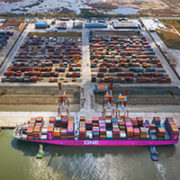Archive | Industry and trade RSS feed for this section
Economics, Governance and public sector management, Industry and trade, Private sector development
 Governance and public sector management, Industry and trade, Information and Communications Technology, Private sector development
Governance and public sector management, Industry and trade, Information and Communications Technology, Private sector development
 Economics, Governance and public sector management, Industry and trade
Economics, Governance and public sector management, Industry and trade
 Industry and trade, Information and Communications Technology, Private sector development
Industry and trade, Information and Communications Technology, Private sector development
 Economics, Industry and trade, Regional cooperation and integration
Economics, Industry and trade, Regional cooperation and integration
 Economics, Industry and trade, Information and Communications Technology
Economics, Industry and trade, Information and Communications Technology
 Industry and trade
Industry and trade
 Industry and trade
Industry and trade
 Economics, Industry and trade, Information and Communications Technology
Economics, Industry and trade, Information and Communications Technology
 Economics, Industry and trade
Economics, Industry and trade

SMEs in global value chains: Catalysts for dynamic and inclusive economic growth

The world has been witnessing the active construction of global value chains (GVCs) by multinational corporations (MNCs) in recent decades. According to the World Bank (2020), the share of GVC trade in world trade increased rapidly from approximately 40% in 1990 to over 50% in 2007 before declining somewhat after the global financial crisis in 2007–2008. MNCs fragment production processes into various stages and locate them in various countries and places where the particular stages can be conducted most efficiently, or at least cost, in order to achieve an efficient production system.
The value creation potential of platforms

The rapid success of modern platforms is a testament to their ability to scale efficiently to the needs of many while providing an undeniable and significant advantage over the older methods that had so far dominated value exchanges. Powered by the public Internet and robust local connectivity, digital platforms rose to the challenge of developing newer, more efficient alternatives in their respective focus areas.
Land readjustment in Japan: Beyond the myth of Japanese consensus and harmony

The landscape of Misato City in Japan has changed drastically in the last 35 years. In the 1980s, Shin-Misato Station was the Mushashino marshalling yard for freight services. Most of the land near the station was used for agriculture, but once residential houses increased and more people came to settle in the area the government built a passenger train station.
Expanding trade opportunities for SMEs in Asia and the Pacific

Small and medium-sized enterprises (SMEs) are the backbone of the Asian economy. They already account for over 95% of all businesses in Asia and employ an estimated 60% of the region’s workforce (Mastercard and the Economist Intelligence Unit 2019). Hence, helping SMEs grow can translate directly into economic and workforce expansion.
The upgraded ASEAN-People’s Republic of China Free Trade Agreement could matter, big time

In 2015, the Association of Southeast Asian Nations (ASEAN) and the People’s Republic of China (PRC) signed an Upgrade Protocol to improve the original Framework Agreement for the ASEAN-People’s Republic of China Free Trade Area (ACFTA) as well as their Agreement on Trade in Goods, Services, and Investment. The Upgrade Protocol entered into force in July 2016, and implementation will start from August 2019.
The spillover effects of digital platforms

“Over-the-top” (OTT) service providers are referred to as so because they allegedly ride exclusively on top of the infrastructure laid by telecommunications service providers. Hidden behind the term OTT is the notion that such providers do not invest in the network infrastructure yet provide the same services as telecommunications service providers. While this may seem intuitive to some through a cursory examination of the marketplace, what such assertions fail to consider are the numerous “edge-of-the-network” investments by OTT service providers as well as the massive efficiency, flexibility, and propensity-to-scale inherent in OTT business models.
Services policies and manufacturing exports

Services and manufacturing are closely intertwined. Manufacturers use services as inputs into their production process. It is difficult to imagine a modern global value chain working without efficient transport services, financial services, logistics, and business services.
How services helped power “Factory Asia”

Measuring productivity in the services sector is fraught with difficulties. One key aspect of the “premature deindustrialization” argument is the hypothesis that services are low productivity relative to manufacturing, and that prospects for rapid and sustained productivity growth, which are the primary source of gains in per capita income, are greater in manufacturing than in services.
What can services trade policy do for sustainable development?

The 2030 Agenda for Sustainable Development has many services dimensions; improved access to and provision of services are necessary for attaining many of the Sustainable Development Goals. Because of their effects on competition in services markets and the ability of foreign providers to supply services to consumers and firms in developing countries, services trade policies should be considered in the arsenal of policy instruments that can be used in efforts to realize sustainable development objectives.
Productivity spillovers from services firms in low- and middle-income countries: What is the role of firm characteristics and services liberalization?

It has been widely acknowledged that services play an important role for other industries, in particular manufacturing. A study by the Organisation for Economic Co-operation and Development (OECD) finds that services represent at least 30% of the value added in manufacturing exports (OECD 2014). Another study by the World Bank suggests that countries with a higher services content in their downstream economies are also those producing more complex goods (Saez et al. 2015).


Search
Subscribe / Connect to Asia Pathways
Subjects
- Agriculture and natural resources
- Blog
- Capacity development
- Climate change
- Economics
- Education
- Energy
- Environment
- Finance sector development
- Gender
- Governance and public sector management
- Health
- Industry and trade
- Information and Communications Technology
- Infrastructure
- Miscellaneous
- Population
- Poverty
- Private sector development
- Regional cooperation and integration
- Sanitation
- Social development and protection
- Transport
- Uncategorized
- Urban development
- Video Blog
- Water
Recent Posts
- Transforming ASEAN: Advancing Regional Integration, Social Inclusion, and Environmental Sustainability
- Development of the Creative Economy in Asia and the Pacific
- Kashima City’s Great Transformation: Where Industry Meets Community
- Mechanization Driving the Future of Agriculture in Asia
- Natural Capital: Valuing Nature to Protect and Restore Ecosystem Services for Sustainable Development




Recent Comments